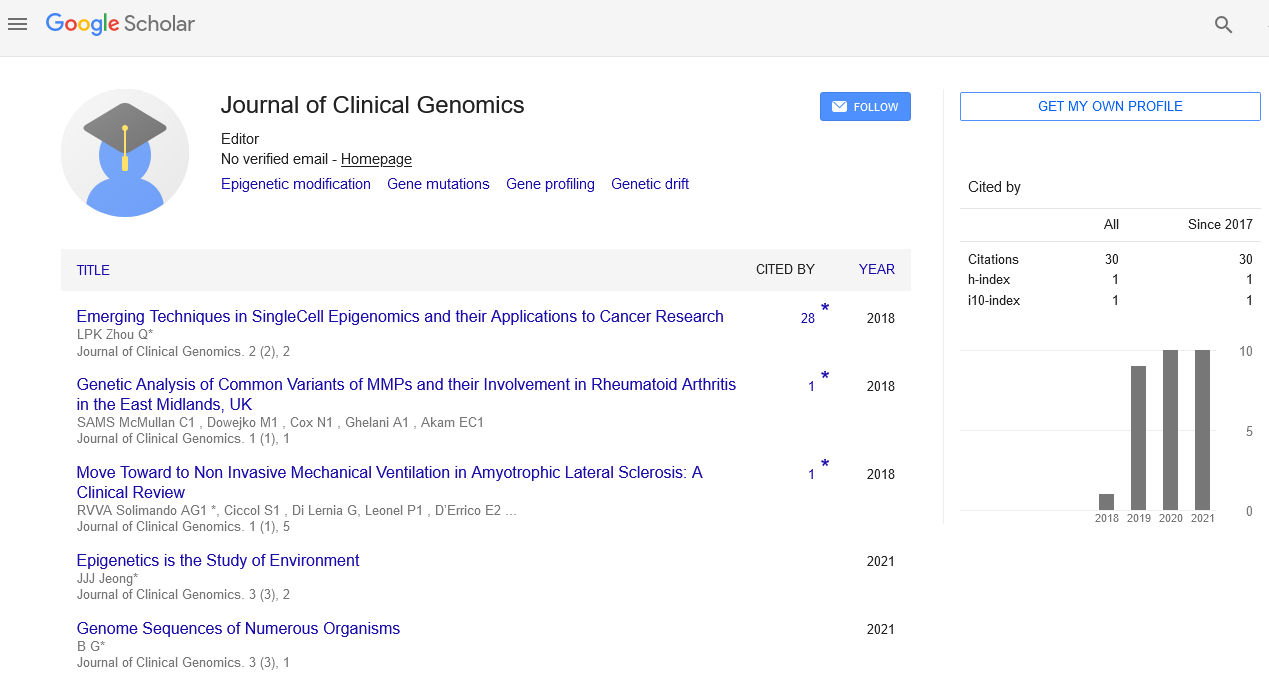Commentary, J Clin Genom Vol: 5 Issue: 2
Genetic Drift and Its Influence on Diversity within Populations
Alex Ramsey*
1Department of Genomics, Washington University School of Medicine, Missouri, USA
*Corresponding Author: Alex Ramsey,
Department of Genomics, Washington
University School of Medicine, Missouri, USA
E-mail: alex@hotmail.com
Received date: 23 May, 2023, Manuscript No. JCG-23-107420;
Editor assigned date: 26 May, 2023, PreQC No. JCG-23-107420 (PQ);
Reviewed date: 12 June, 2023, QC No. JCG-23-107420;
Revised date: 19 June, 2023, Manuscript No. JCG-23-107420 (R);
Published date: 26 June, 2023 DOI: 10.4172/JCG.1000127
Citation: Ramsey A (2023) Genetic Drift and Its Influence on Diversity within Populations. J Clin Genom 5:2.
Description
Genetic drift is a fundamental evolutionary process that occurs due to the random fluctuations in allele frequencies within a population over generations. Unlike natural selection, genetic drift is driven by chance events rather than selective pressures. Genetic drift occurs when random events, such as the death or migration of individuals result in changes to the allele frequencies within a population. As a result, certain alleles may become more or less common purely due to chance, regardless of their adaptive or disadvantageous nature. In small populations, genetic drift can have a more impact leading to rapid changes in allele frequencies. Conversely, in large populations, the effects of genetic drift are usually less noticeable. One significant consequence of genetic drift is the reduction of genetic diversity within a population. As rare alleles are lost over generations, genetic variation is gradually diminished.
This is particularly evident in small populations that undergo a phenomenon known as the founder effect. When a small group of individuals establishes a new population, the genetic composition of the founder group becomes the basis for the entire population, leading to reduced genetic diversity compared to the original population. In addition to reducing genetic diversity, genetic drift can also increase genetic differentiation between populations. As different populations experience random fluctuations in allele frequencies, they can become genetically distinct from one another. This process, known as genetic differentiation or genetic divergence, can occur even without geographic isolation or natural selection. Over time, populations that experience independent genetic drift events accumulate unique sets of alleles, resulting in increased genetic differentiation.
Although genetic drift can reduce genetic diversity, it can also have unexpected effects that increase diversity within populations. This phenomenon, known as the "drift paradox," occurs when new mutations arise and become fixed within small populations due to the effects of genetic drift. In larger populations, these new mutations may be lost or take longer to spread throughout the population.
Therefore, genetic drift can sometimes contribute to the generation of new genetic variants and ultimately increase genetic diversity. The impact of genetic drift on genetic diversity has implications for various fields, including conservation biology and human genetics. In conservation biology, small and isolated populations are particularly vulnerable to the effects of genetic drift. Reduced genetic diversity can decrease a population's ability to adapt to environmental changes, making them more susceptible to extinction.
Similarly, in human genetics, genetic drift has played a significant role in shaping the genetic diversity observed among different populations. Genetic drift, along with other evolutionary processes such as migration and natural selection, has contributed to the genetic variation observed among human populations worldwide. Genetic drift, driven by random fluctuations in allele frequencies, is a key evolutionary process that impacts genetic diversity within populations.
While it can reduce genetic diversity and lead to genetic differentiation, genetic drift can also contribute to the generation of new genetic variants. Recognizing the role of genetic drift in shaping genetic diversity is vital for understanding evolutionary processes, implementing effective conservation strategies, and unraveling the genetic patterns observed in different populations. By studying and appreciating the impact of genetic drift, we gain a deeper understanding of the complex dynamics that drive genetic diversity and evolution.
 Spanish
Spanish  Chinese
Chinese  Russian
Russian  German
German  French
French  Japanese
Japanese  Portuguese
Portuguese  Hindi
Hindi 